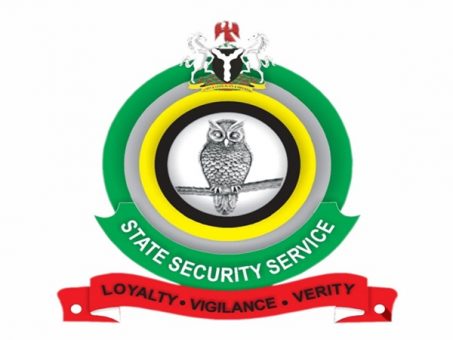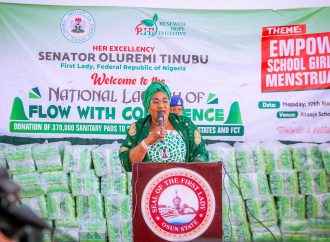Leaked DSS Terror Alert Raises Questions Over Security Breach, Motives Behind Exposure A classified memo from the Department of State Services (DSS) warning of a planned terror attack by the Islamic State of West Africa Province (ISWAP) on Ondo and Kogi states has surfaced online, sparking nationwide concern and speculation over the motive behind the
Leaked DSS Terror Alert Raises Questions Over Security Breach, Motives Behind Exposure

A classified memo from the Department of State Services (DSS) warning of a planned terror attack by the Islamic State of West Africa Province (ISWAP) on Ondo and Kogi states has surfaced online, sparking nationwide concern and speculation over the motive behind the leak and those responsible for it.
Consensus And Contention? Osun APC Faces Fresh Test Of Strength Before 2026 Polls
The leaked document, which was addressed to the 32 Artillery Brigade of the Nigerian Army in Akure, Ondo State, detailed credible intelligence indicating ISWAP’s plans to launch coordinated assaults on multiple communities in the two states. Specifically mentioned as potential targets were Eriti Akoko and Oyin Akoko in Akoko North-West Local Government Area, and Owo town in Owo Local Government Area — the same town where gunmen massacred over 40 worshippers at St. Francis Catholic Church in June 2022.
The exposure of the DSS memo, which was meant for restricted circulation within the nation’s security hierarchy, has raised serious questions about internal information management and the possible intentions behind the leak. Analysts say the breach could compromise ongoing counterterrorism operations, alert the terrorists to government awareness, or even cause unnecessary panic among residents of the affected states.
A Breach of Trust Within Security Circles
Security sources, speaking under anonymity, expressed dismay at the development, describing it as “a dangerous compromise of operational intelligence.” According to one senior officer, “such memos are never meant for public consumption. They are part of inter-agency coordination efforts aimed at preemptive security action. When such documents leak, they not only jeopardize lives but also undermine confidence among sister security agencies.”
The DSS memo was intended to ensure joint readiness between intelligence operatives and the military in the event of an attack. However, once the memo went viral on social media platforms, it triggered widespread fear among residents in Ondo and Kogi, with some communities reportedly beginning to restrict nighttime movements and suspend gatherings.
Motive and Responsibility: Who Leaked the Memo?
While the DSS has yet to issue an official statement confirming the authenticity of the leaked document, security watchers suggest that the leak could have originated from within the receiving agency or from intermediaries who had temporary access to the communication. Some speculate that the leak might have been politically motivated, aimed at embarrassing the DSS or suggesting lapses in inter-agency confidentiality.
Others argue that the leak may have been an intentional move by a whistleblower seeking to alert the public to a potential threat, especially in the wake of past incidents where intelligence warnings were allegedly ignored until tragedy struck. In the 2022 Owo church attack, local residents had claimed that earlier warnings of planned attacks were not acted upon promptly by authorities.
A counter-argument, however, insists that leaking such sensitive information to the public does more harm than good. It not only risks exposing sources and methods of intelligence gathering but may also prompt terrorists to change plans, thereby complicating security operations.
Ondo, Kogi Authorities React
In response to the viral memo, the Ondo State Government reassured residents of heightened security vigilance. Governor Lucky Aiyedatiwa’s spokesperson stated that the government was in close communication with security agencies to ensure that “every corner of the state remains secure.”
Similarly, the Kogi State Government, through its Commissioner for Information, Kingsley Fanwo, said the administration was aware of security alerts and had strengthened surveillance, especially around border communities between Kogi, Ondo, and Ekiti. “We urge citizens not to panic but to cooperate with security agencies and promptly report suspicious movements,” Fanwo said.
Implications for National Security
Security experts warn that the unauthorized disclosure of such classified communication could weaken national security coordination and fuel mistrust among agencies. Dr. Kabiru Adamu, a security consultant, told The Nation that “Nigeria’s greatest security challenge is not the absence of intelligence but the misuse or leakage of intelligence. This incident underscores the urgent need to overhaul how classified information is stored and transmitted.”
He added that the incident could also embolden terrorist groups like ISWAP, who might interpret the leak as a sign of internal disunity or institutional weakness within Nigeria’s security framework.
DSS Tight-Lipped as Investigation Looms
As of Monday, neither the DSS nor the Nigerian Army had issued a formal statement regarding the leak or the status of the alleged planned attacks. However, insiders suggest that an internal probe has been launched to trace the source of the leak. Such investigations typically involve forensic checks on communication channels, document trails, and access logs.
Observers believe that if the culprit is found within the ranks of any agency, disciplinary actions — including dismissal or prosecution under the Official Secrets Act — could follow.
Citizens Urged to Remain Vigilant
Amidst the controversy, security agencies have continued to urge residents in the affected regions to remain calm but vigilant. Patrols have reportedly been intensified in vulnerable areas, and community leaders have been advised to report unfamiliar faces or suspicious gatherings.
While the leak of the DSS memo has stirred public alarm, it has also reignited debate about the delicate balance between public awareness and operational secrecy in managing national security threats.
As investigations continue, one question lingers in the minds of many Nigerians: was the leak an act of negligence, sabotage, or deliberate warning — and who truly benefits from it?



















Leave a Comment
Your email address will not be published. Required fields are marked with *